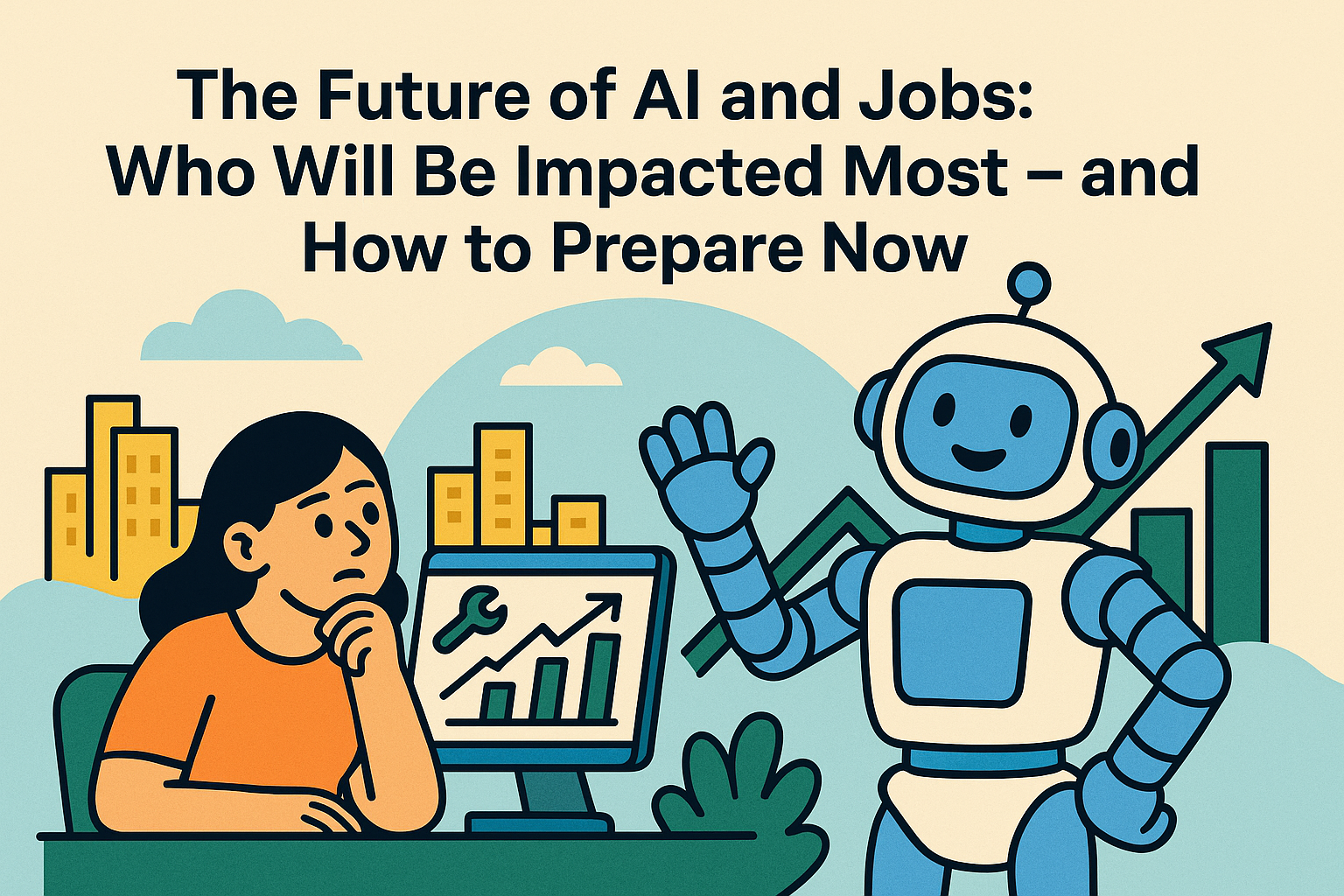Artificial intelligence is advancing faster than any previous workplace technology shift, raising urgent questions about the future of work. While AI promises major productivity gains and entirely new career fields, it will also redefine — and in many cases replace — existing jobs. The key isn’t to fear the change, but to prepare for it.
This article breaks down who is most at risk, which roles are safest, and the educational paths that will best position workers to thrive in an AI-driven economy.
How AI Is Changing the Workforce
AI is no longer a future possibility — it’s already embedded in the systems that power customer service, transportation, healthcare, logistics, finance, software development, and even the creative industries.
Three major shifts define the AI future:
- Automation of repetitive tasks at scale
- Acceleration of decision-making through large data models
- Creation of new job fields tied to AI oversight, ethics, data integrity, design, and engineering
Because AI handles predictable, rules-based work extremely well, industries built on repetitive tasks are facing the largest shakeups.
Industries Most Likely to See Job Disruption
1. Administrative & Clerical Support
Roles with heavy documentation or scheduling components — such as office assistants, data entry specialists, and bookkeepers — are highly automatable. AI can now draft emails, summarize meetings, manage calendars, and process forms with near-zero error.
2. Customer Support
AI-powered chatbots can handle most routine customer inquiries. Human agents will still be needed, but in more specialized problem-solving roles rather than frontline response.
3. Transportation & Logistics
Autonomous vehicles and AI route-optimization systems are beginning to replace long-haul driving, warehouse picking, and delivery routing tasks.
4. Retail & Hospitality
AI tools already manage inventory, checkout processes, and staffing. Automated kiosks and smart checkout technology continue to expand.
5. Basic Content Production
AI excels at generating draft-level written content, simple graphics, and templated media. Human editors and strategists, however, will remain essential.
Careers That Will Grow — Not Shrink
1. AI Engineering & Software Development
Demand for engineers who build, deploy, and maintain AI models is skyrocketing.
2. Cybersecurity & Data Protection
As AI expands, so does the surface area for cyberattacks. Cybersecurity professionals will be in higher demand than ever.
3. Healthcare & Medical Tech
Nursing, diagnostics, AI-assisted surgery, and bioinformatics will grow significantly as populations age.
4. Skilled Trades
Electricians, plumbers, HVAC technicians, and mechanics rely on hands-on physical work — something AI cannot replicate.
5. Human-Centered Roles
Management, teaching, counseling, negotiation, and leadership depend deeply on emotional intelligence.
6. AI Oversight & Ethics
Companies need professionals who understand bias, fairness, compliance, and regulatory impacts.
How to Prepare: Skills That Will Be Most Valuable
To stay competitive, workers should prioritize skills that complement AI — not compete with it.
Technical Skills to Build
- Data literacy
- Coding fundamentals (Python is a top choice)
- AI/ML basics
- Cybersecurity awareness
- Cloud computing (AWS, Azure, GCP)
Human Skills That AI Cannot Replace
- Critical thinking
- Communication and storytelling
- Creativity and problem-solving
- Leadership and collaboration
- Adaptability and resilience
These skills will remain foundational, regardless of industry.
Recommended Education & Learning Path
For Students (High School & College)
- STEM degrees: computer science, data science, engineering
- Business + tech hybrids: information systems, analytics
- Healthcare programs with AI integration
- Vocational training for skilled trades
For Working Adults
You don’t need to return to college — you need targeted skill-building:
For People in At-Risk Careers
Focus on upskilling rather than replacing your career completely:
- Learn how AI tools can augment your job
- Shift to higher-value tasks (strategy, analysis, customer care)
Build digital competency and data literacyinar dapibus leo.
Practical Steps You Can Take Today
- Start using AI tools in your daily work to stay ahead.
- Take at least one digital skills course (analytics, cloud, or automation).
- Track AI developments in your industry to understand upcoming changes.
- Build a portfolio that demonstrates your ability to work with modern tools.
- Develop strong communication and leadership skills — they will only become more important2
FAQ
Will AI replace all jobs?
No. It will replace tasks, not entire professions. New roles will emerge as old ones change.
Which jobs are safest?
Skilled trades, healthcare, leadership roles, and jobs requiring emotional intelligence or physical labor.
Do I need to learn programming?
Not always — but understanding AI tools and data concepts is increasingly necessary.
Is it too late to reskill?
Never. Most in-demand career transitions now take 3–12 months of focused training.

